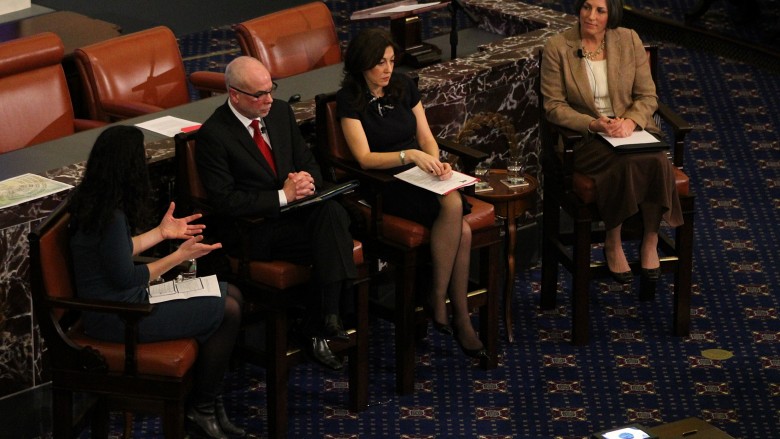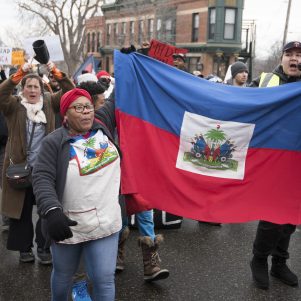Refugee issues aired by expert panel in Boston
By Evan Lips | January 28, 2016, 21:59 EST
 Boston Globe reporter Maria Sacchetti, left, poses a question to the Center for Immigration Studies’s Jessica Vaughan, far right. Seated in between are Phil Nadeau, deputy city administrator of Lewiston, Maine, (left) and Evan Millona (right), executive director of the Massachusetts Immigrant and Refugee Advocacy Coalition. (New Boston Post photo by Evan Lips)
Boston Globe reporter Maria Sacchetti, left, poses a question to the Center for Immigration Studies’s Jessica Vaughan, far right. Seated in between are Phil Nadeau, deputy city administrator of Lewiston, Maine, (left) and Evan Millona (right), executive director of the Massachusetts Immigrant and Refugee Advocacy Coalition. (New Boston Post photo by Evan Lips) BOSTON – Massachusetts U.S. Rep. Seth Moulton urged attendees ahead of a panel discussion on refugee resettlement in New England to resist “denying the American dream” to those living in peril abroad, but a former State Department foreign service officer reminded listeners that the asylum vetting process isn’t as thorough as it seems.
Moulton, a Democrat and Marine Corps veteran who served in Iraq, delivered his remarks at the Edward M. Kennedy Institute for the United States Senate before the Thursday night discussion, the latest entry in the institute’s “Getting to the Point” series in which experts are called upon to chime in on complicated current events.
The congressman from Salem didn’t participate in the panel discussion but stressed in his 10-minute speech the late Ted Kennedy’s role in the U.S. Senate as “a champion of refugees.” Kennedy, who served in the upper chamber of Congress for more than 40 years, sponsored 70 bills dealing with refugees.
During the discussion, however, panelist Jessica Vaughan of the Center for Immigration Studies pointed out that the current makeup of refugees is markedly different than those who sought U.S. asylum during Kennedy’s decades in the Senate. A former foreign service officer, she talked about Syria’s role in the refugee vetting process, which begins with regional United Nations officers.
“Their job is to help them get to a safe place,” Vaughan said of refugees and UN officials. “Their prime concern is not the security risk, it’s relocating them.”
Thursday’s discussion was framed against the backdrop of Republican presidential contender Ted Cruz’s proposal, introduced by the Texas senator in November, to impose a temporary moratorium on admitting refugees from nations where at least some territory is controlled by terrorist groups.
Panelist Eva A. Millona, executive director of the Massachusetts Immigrant and Refugee Advocacy Coalition, described the multi-step vetting process and pointed out that the journey typically takes two years.
“The security screening is comprehensive and vigorous,” Millona countered, claiming that out of roughly 3 million foreign refugees who have settled in the U.S. since 1975, only three have been arrested for crimes identified as acts of terrorism.
Vaughan disputed Millona’s statistic, citing the findings of the Senate Judiciary Committee which identified 14 cases of refugees being arrested for terrorism-related actions or associations since 2014 alone.
“Until we have a machine that can read someone’s mind, we will never know if someone is a terrorist,” Vaughan said. “What we have to do as a country is try to minimize that risk. That’s why (FBI Director) James Comey has advised Congress against admitting a large number of Syrian refugees.”
“You can check databases until the cows come home but we have nothing to check them against.”
The third panelist, Phil Nadeau, is the deputy city administrator in Lewiston, Maine, a city that has absorbed thousands of Somali refugees since 2001. Nadeau, an expert in the funding process for refugee resettlement, also noted the difference in refugee composition between 1980 – the year Congress passed Kennedy’s Refugee Act – and the present day.
“About 11 countries represented the refugee population then,” he said. “Today I believe the data shows about 66 different countries and something to the order of about 115 different languages.”
Nadeau said the process of helping refugees become acclimated to their respective communities is a challenge. He said one of the issues in Lewiston is high rates of illiteracy among new arrivals.
“That poses significant challenges relative to job training,” he said. “The core mission is self-sufficiency.”
Thursday’s panel discussion was moderated by Maria Sacchetti, an immigration reporter for the Boston Globe.











